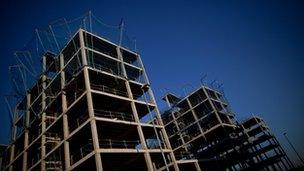Spanish banks need more than 40bn euros
- Published
- comments

Spain's banks have been hit hard by the property crash
The International Monetary Fund's estimate that Spanish banks need to raise around 40bn euros (£32bn; $50bn) of additional capital as protection against potential future losses is already out of date and too low - or so the IMF concedes.
There are two and a half reasons why, when in the coming days Spain finalises how much additional capital its banks need to find, the number will turn out to be greater.
First, the IMF did not fully estimate, external the possible losses on loans in what bankers call "forbearance" - which is where banks have allowed borrowers in difficulty to temporarily cease payments. A separate independent assessment of Spanish banks' assets, commissioned by the government, is likely to show that the value of some of these loans is less than the IMF has assumed.
Second, there will be further costs for banks from the rebuilding and reorganisation they require to make themselves viable once more.
Third, (actually this is the second-and-a-half reason, because I am unclear about how the Spanish government will address it), the independent assessors may conclude that the banks should make greater provisions for possible losses on their loans to the Spanish government - because the price of Spanish government bonds has deteriorated since the IMF determined the haircut or discount that should apply to these bonds.
What the IMF report confirms is that the finances of the Spanish government and of the Spanish banks live and die together - in that the banks hold around two-fifths of Spanish central government debt, which is equivalent to 8% of all the banks' loans and investments. Or to put it another way, the Spanish government would have struggled to finance itself without loans from the banks and the banks would be bust if the government were to go bust.
All of which reinforces the likelihood of the Spanish government receiving a substantial bailout package from the eurozone's European Financial Stability Facility - because it cannot borrow the sums required by its banks from its banks (doh!) and right now other investors are increasingly reluctant to lend to it.
For what it's worth, about 10 days ago I said on the Ten O'Clock News that Spanish banks may need around 85bn euros of additional capital, including the 23.5bn already requested by Spain's fourth biggest bank, Bankia.
By the way, it is worth noting that the IMF concludes that Spain's two biggest banks, Santander and BBVA, do not need to raise any additional capital.
The bulk of the hole in Spanish banks is in seven former savings banks, including Bankia, that already rely on financial support from the government, and collectively represent more than a fifth of all loans in Spain.
These banks have a high share of mortgage lending and are heavily exposed to commercial property and construction lending - which is what has done for them, because Spain's housing market is weak and becoming weaker, and its commercial property sector is a basket case.